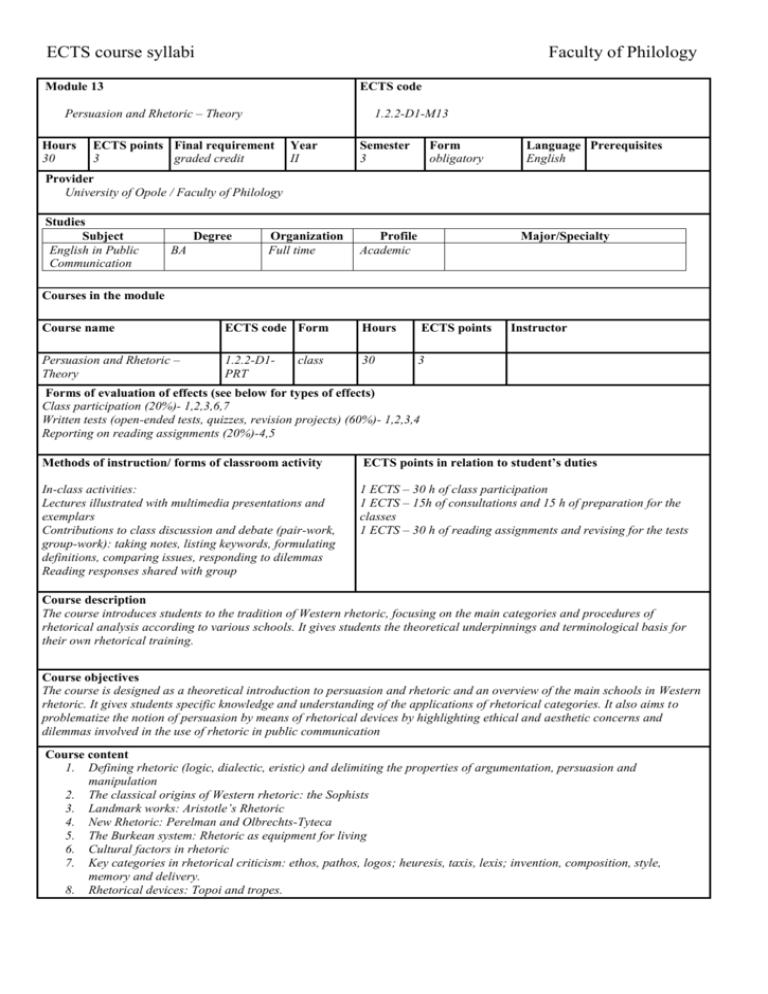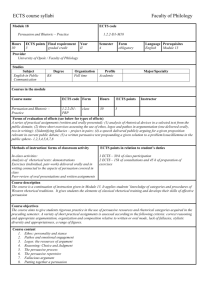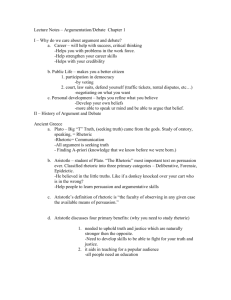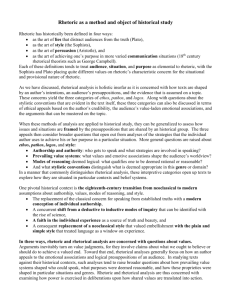Instytutowy Pakiet ECTS 2012/13 - English in Public Communication
advertisement

ECTS course syllabi Faculty of Philology Module 13 ECTS code Persuasion and Rhetoric – Theory Hours 30 1.2.2-D1-M13 ECTS points Final requirement 3 graded credit Year II Semester 3 Organization Full time Profile Academic Form obligatory Language Prerequisites English Provider University of Opole / Faculty of Philology Studies Subject English in Public Communication Degree BA Major/Specialty Courses in the module Course name ECTS code Form Hours ECTS points Persuasion and Rhetoric – Theory 1.2.2-D1PRT 30 3 class Instructor Forms of evaluation of effects (see below for types of effects) Class participation (20%)- 1,2,3,6,7 Written tests (open-ended tests, quizzes, revision projects) (60%)- 1,2,3,4 Reporting on reading assignments (20%)-4,5 Methods of instruction/ forms of classroom activity ECTS points in relation to student’s duties In-class activities: Lectures illustrated with multimedia presentations and exemplars Contributions to class discussion and debate (pair-work, group-work): taking notes, listing keywords, formulating definitions, comparing issues, responding to dilemmas Reading responses shared with group 1 ECTS – 30 h of class participation 1 ECTS – 15h of consultations and 15 h of preparation for the classes 1 ECTS – 30 h of reading assignments and revising for the tests Course description The course introduces students to the tradition of Western rhetoric, focusing on the main categories and procedures of rhetorical analysis according to various schools. It gives students the theoretical underpinnings and terminological basis for their own rhetorical training. Course objectives The course is designed as a theoretical introduction to persuasion and rhetoric and an overview of the main schools in Western rhetoric. It gives students specific knowledge and understanding of the applications of rhetorical categories. It also aims to problematize the notion of persuasion by means of rhetorical devices by highlighting ethical and aesthetic concerns and dilemmas involved in the use of rhetoric in public communication Course content 1. Defining rhetoric (logic, dialectic, eristic) and delimiting the properties of argumentation, persuasion and manipulation 2. The classical origins of Western rhetoric: the Sophists 3. Landmark works: Aristotle’s Rhetoric 4. New Rhetoric: Perelman and Olbrechts-Tyteca 5. The Burkean system: Rhetoric as equipment for living 6. Cultural factors in rhetoric 7. Key categories in rhetorical criticism: ethos, pathos, logos; heuresis, taxis, lexis; invention, composition, style, memory and delivery. 8. Rhetorical devices: Topoi and tropes. Reading list A. obligatory reading (to get a credit): A.1. used in class Aristotle (2010) Rhetoric. Translated by W. Rhys Roberts. Electronic Classics Series. Philadelphia: Pennsylvania University. Burke, K. (1950). A rhetoric of motives. Berkeley: University of California Press. Burke, K. (1966). Language as symbolic action. Berkeley: University of California Press. Cicero (1969). Orator. Translated by H.M. Hubbel. London: Heinemman. Cockcroft, R. and Cockcroft, S. (2005) Persuading People: An Introduction to Rhetoric. Basingstoke: Palgrave Macmillan. Perelman, Ch.and Olbrechts-Tyteca, L. (1969) The New Rhetoric: A Treatise on Argumentation. Notre Dame: University of Notre Dame. Quintilian (1920-2). Institutio Oratoria. Translated by H.B. Butler. London: Heinemman. A.2. used for self-study Selected articles from such journals as Rhetoric, Communication Quarterly, Communication Studies, College Composition and Communication B. supplementary reading Effects Knowledge Students: 1. have basic knowledge about the significance of the study of language and communication within the discipline of philology, about their research subjects as well as their methodological specificity (K_W02) 2. have a systematic detailed knowledge of the theory and practice of persuasion and rhetoric, of origins and development of various traditions and categories of paradigms in public communication (K_W10) 3. are acquainted with the ethical standards and codes of practice in public communication (K_W17) Skills Students can: 4. apply the terminology, theoretical frameworks, research paradigms and methodological approaches of linguistics and discouse studies (including those of semiotics, sociolinguistics, pragmatics, stylistics and rhetoric), as well as communication studies and media studies(K_U04) 5. comprehend spoken and written texts in English (relative to C1 level) to identify the general point/attitude and to find specific information in authentic public communications (K_U14) Social competences Students: 6. shape their opinions in relation to the gained general and detailed knowledge gained in the course(K_K03) 7. are aware of the significance of public communication for a democratic dialogue in the public sphere (K_K13) Contact molekk@uni.opole.pl









